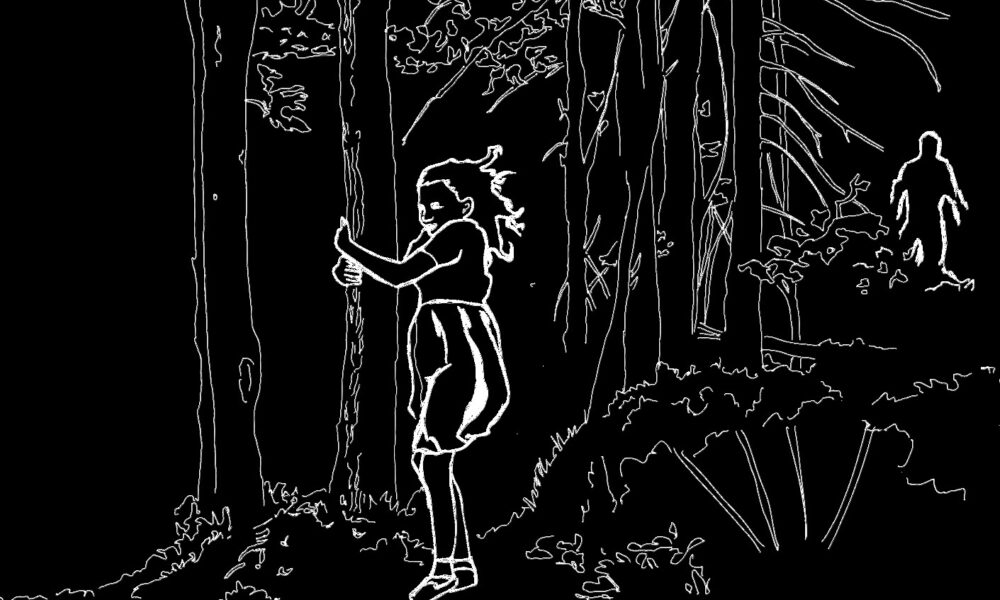This October, Festival du Nouveau Cinéma wrapped up its 54th edition, featuring a robust program of 200 films over 12 days. The Montreal-based film festival prides itself on showcasing diverse international features and short films, while spotlighting a strong selection of Canadian films. This edition’s closing film, Le Train, is a mesmerizing debut from renowned Quebecois playwright and actress, Marie Brassard.
Le Train follows Agathe, a young girl in 1960s Quebec, who dreams of a fantastical world where she is not plagued by severe asthma. As she grows into adolescence, she meets a man who shares her same longing for something more than their reality. Rising stars Thalie Rhainds and Electra Codina Morelli, who play Agathe at various ages, deliver captivating performances that hint at promising careers ahead. The exquisite Larissa Corriveau, who plays Thérèse, Agathe’s eccentric mother, shines in her portrayal of a woman balancing professional life, single motherhood, and creative pursuits.
In an interview with The Tribune, Brassard reflected on the experience of writing and directing her first feature film, noting how it differs from theatre. She described theatre as ephemeral: An experience that creates unique experiences each time. It lives only in our memories because it takes place in the ‘real’ world with ‘real’ people, as opposed to cinema.
“Cinema is different. At one point, you have to stop [adding on] for it to exist as an object, and from that moment on, it’s gonna be that. You have to let it go,” Brassard said. “And at the same time, what’s beautiful is that you can look at it again and again, and eventually have a different experience as well, but the thing is that it will persist in time.”
Inspired by her own childhood experiences with asthma in the Quebec suburbs and her coming-of-age in 1970s Montreal, Brassard sought to recreate the feeling of hope she felt at that time, contrary to today’s cynicism and increased isolation.
“I wanted to make a film that would state that there was a time [in Quebec] where people were dreaming. People were dreaming of a better world, a more equal world,” Brassard said.
As someone who admires the aesthetics of the 1970s, I found the visuals of Agathe’s teenage years a feast for the eyes. Brassard mentioned that she remembers the aftermath of Montreal’s Expo 67, a world’s fair in which there was a liberating spirit in the air, both politically and creatively. Le Train recreates these artistic communities and countercultures that she found in the city, where intellectual and creative thoughts were freely exchanged.
Brassard grew up listening to the sound of trains running through her town, dreaming of the places they would go. In Le Train, these dreams recur and contrast the rest of the film in their black-and-white stylization, as Agathe tries to figure out both their meaning and the other world that intrigues her. Brassard used these childhood dreams as the starting point of her script.
“I imagined that it was a lumberjack there [by the train], who was cutting trees and protecting our world, and that he was standing at the frontier between us and the world that we don’t know,” Brassard said.
The themes of identity, dreams, and a blend of fantasy run through much of Brassard’s work.
“There’s something fundamental that is part of you that you cannot escape from. And I think that for me, it is a very thin layer between dream and reality, or between the imagined and reality,” Brassard said. “And somehow, it intersects with [the] science worlds. When we think of quantum realities, where scientists reflect on the possibility of parallel worlds that we cannot perceive.”
As Le Train rolled its final frames, it left audiences with a resonant message that speaks to both nostalgia and hope, reminding viewers of a time, and perhaps a place, where dreaming of a better world still felt possible.









